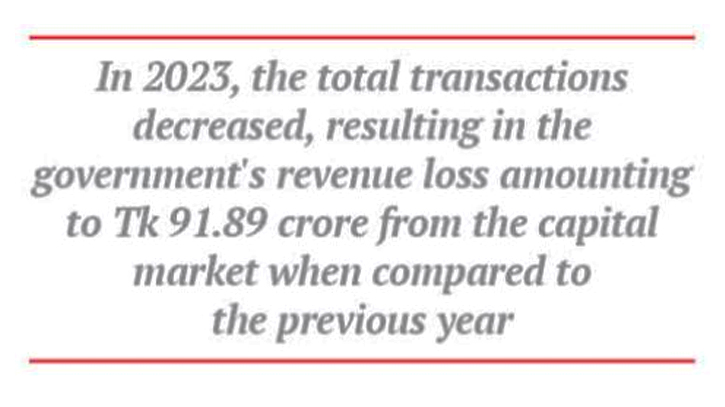
Photo: Messenger
The government has incurred a substantial revenue loss of nearly a hundred crores from the Dhaka Stock Exchange (DSE), the primary capital market of the country. This financial setback is in comparison to the revenue collected through tax transactions in the year 2022. This information has been sourced from within the DSE.
According to data provided by the DSE, the government's overall revenue generated from transactions spanning January 1 to December 31, 2023, amounted to Tk 227.22 crore. Throughout the outgoing year, the total value of share sales by investors and entrepreneur-directors reached Tk 1,41,059 crore 93 lakhs.
In the preceding year, 2022, the total transactions on the Dhaka Stock Exchange (DSE) comprised 2,34,447 crore 93 lakh units of shares, bonds, and mutual funds. From these transactions, the government generated a total revenue of 319 crore 10 lakh 31 thousand 53 taka.
Comparatively, in 2023, the total transactions decreased, resulting in the government's revenue loss amounting to Tk 91.89 crore from the capital market when compared to the previous year. It is noteworthy that in 2022, the government also experienced a revenue loss of 105 crore taka. In 2021, the government had received a revenue of Tk 425 crore 86 thousand 920 from the capital market.
Insiders in the capital market assert that the decrease in transactions can be attributed to the sustained implementation of the floor price in the capital market throughout the year. This measure has resulted in reduced activity and, subsequently, lower revenue for the government from this sector.
Furthermore, the persisting dollar crisis, influenced by events such as the Israel-Palestine conflict and the Ukraine-Russia war, has also contributed to a slowdown in trading within the Bangladeshi capital market. Market participants believe that these geopolitical factors have impacted the overall market sentiment, resulting in decreased transactions and, consequently, reduced government revenue from the Dhaka Stock Exchange (DSE).
Those closely involved with the capital market express optimism that, with the stabilisation of the market, there will be an uptick in transactions, leading to increased tax revenue for the government.
As per the Income Tax Ordinance of the National Board of Revenue, the government derives revenue from two categories of share trading. The first pertains to earnings from the trading of shares by company founder-managers. The second involves imposing taxes on brokerage houses for the buying and selling of investors' shares.
In the case of the first type of tax, a rate of 10.05 percent is applied to the daily transactions of Dhaka Stock Exchange (DSE) stakeholders. The revenue generated from this sector in 2023 amounted to Tk 142. 20 crore.
On another note, in accordance with BSEC Rules 53-M, revenue income from share trading and the transfer of shares to sponsor shareholders is taxed at a rate of 5 percent, resulting in a total of Tk 85.02 crore in revenue for the government.
In summary, the overall revenue generated from the Dhaka Stock Exchange (DSE) amounts to Tk 227.22 crore. This entire sum has been deposited by the DSE with the National Board of Revenue (NBR).
Comparatively, in the previous year, i.e., in 2022, a higher revenue of Tk 236.43 crore was generated. This revenue was derived from a 5 percent tax on the daily transactions of DSE stakeholders.
Additionally, in accordance with BSEC Rules 53-M, revenue generated by sponsor shareholders from trading and the transfer of shares, taxed at a rate of 5 percent, amounts to Tk 82.67 crore. Combining this with the revenue from other sources, the total revenue from the Dhaka Stock Exchange (DSE) is reported to be Tk 319.10 crore.
DSE director Shakil Rizvi expressed the view that the capital market's performance plays a crucial role in determining the level of transactions. He emphasised that an improved capital market is likely to lead to increased transactions.
The capital market experienced tumultuous conditions throughout the last year, leading to a decrease in transactions. The imposition of a floor price is identified as the primary factor contributing to the decline in transactions. The floor price mechanism led to a situation where shares of many companies remained stagnant throughout the year. Despite investor demand, the inability to buy and sell shares due to the floor price constraint resulted in a notable reduction in overall market transactions.
Mohammad Rezaul Karim, the executive director and spokesperson of the Bangladesh Securities and Exchange Commission (BSEC), has indicated that under the leadership of Professor Shibli Rubayat Ul Islam, the commission is actively working to ensure stability in the capital market. Several initiatives have been undertaken with the aim of boosting the participation of individual, institutional, and foreign investors to enhance transactions in the secondary market.
Karim expressed optimism, noting that the recent election in the country was conducted peacefully. He believes that this peaceful environment will contribute to a positive outlook for the market.
Messenger/Sun Yath








